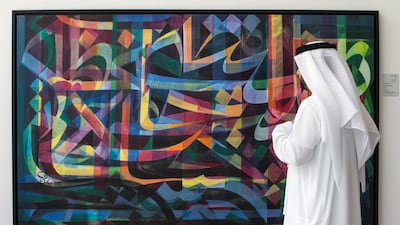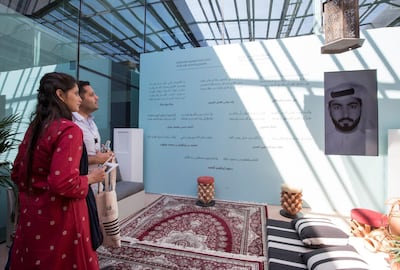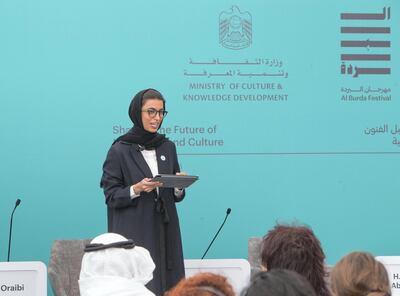The role of art in promoting a culture cannot be underestimated. Art has the power to engage and inspire younger generations by giving them a deeper connection to their identity. Through this medium, proponents of Islamic art not only forge new pathways but also strengthen the future position of Islamic culture.
There are talented and inspiring individuals in Muslim communities around the world, who are achieving great things with faith-inspired work. Determining what informs their spiritual, creative and artistic journeys can lend an answer to the oft-asked question: what does Islamic art mean today?
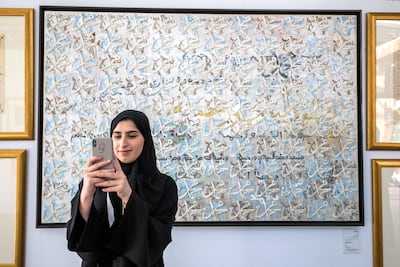
In an academic sense, the term does not refer to a particular style or period but covers a broad view and spans a vast geographical swathe and diversity of genres, encompassing artworks produced across one-fifth of the world in the traditional heartland of Islam – from Spain to India – during the last 1,400 years.
Unlike the arts of different faiths, from Christianity and Judaism to Hinduism and more, Islamic art not only includes works created by Muslim artists primarily for patrons of the same faith, nor is it limited to religious art. It also informs architecture, the decorative arts and all other creative forms produced by Muslims and non-Muslims alike in the Islamic world. This art movement was also the first to move away from depicting natural objects and establish an abstract style of expression, specifically focused on three forms – calligraphy, geometric patterns and floral motifs.
So when we discuss the evolution of Islamic art, we must look at the wide variety of artistic backgrounds, tools and methods that have contributed to making Islamic art what it is today. This has fostered the development of a distinctive culture with its own unique, artistic language. It is this uniqueness that is reflected in art and architecture throughout the Muslim world.
The inaugural Al Burda Festival, held in Abu Dhabi earlier this week, addresses this dichotomy between our past and future, seeking to explore ways of connecting the two and providing a larger platform for discussion on Islamic arts and culture. Today there is significant talent waiting to be discovered, locally and globally. The plenaries, masterclasses and live performances that were part of the festival's programme have all, in their own way, served to revive interest and enable a deeper connection with Islamic culture.
While Islamic art today carries the hallmarks of more traditional art forms, it has also allowed for the establishment of symbolism. It describes a cultural and artistic identity forged through time and shifting geographical boundaries. As Islam spread and encountered new peoples and lands, the concept of its art forms broadened, appropriating new styles, technologies or simply updating techniques that resulted in ever-changing styles. What is often overlooked is that these art forms took centuries to develop, evolving to reflect the culture of the places where Islam spread its reach and absorbing techniques from different locales. As a result, Islamic art continues to expand its influence and carve a niche in the contemporary art scene.
Take, for instance, the Dubai-based artist El Seed. Popular for his expressive calligraphic forms, his artworks are spray-painted on buildings and walls in cities across the world, including Abu Dhabi, where he collaborated with 20 schoolchildren to produce the capital's first mural on Abu Dhabi's municipality building. He has even created art in areas with a controversial history, such as the Demilitarised Zone (DMZ) between North and South Korea. His work bridges the gap between street art and classical Arabic calligraphy.
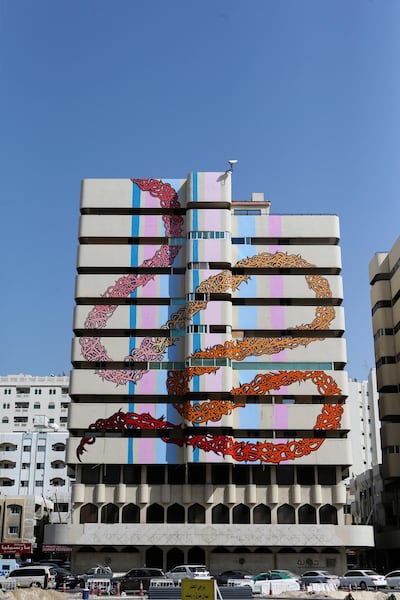
Karim Jabbari, an artist celebrated for his expressive images and artwork using light calligraphy, often uses ancient Kufic and Maghrebi Arabic script in his work. Currently, the Victoria and Albert Museum in London is exhibiting the works of the Jameel Prize finalists, which range from fashion to visual art, showcasing the significance and relevance of Islamic motifs in the modern age.
These examples might appear to be the antithesis of traditional art. The truth is that Islamic art cannot be limited to religious art and architecture in classical Islamic cities. What makes these artworks Islamic is their ability to transcend the artists’ own roots, instead reflecting unique forms and precise methods, regardless of their religious purpose or content.

Cities can play a pioneering role in capturing the essence of a diverse and globalised Islamic cultural expression. For 15 years preceding this year's festival, the Al Burda Award has provided an artistic platform for talented and visionary individuals to come together. It also makes a significant contribution to promoting a culture of Islam-inspired creativity, even as global digital and virtual platforms continue to open opportunities for connections across the world.
Such efforts can build upon the cornerstones of Islamic culture to cultivate dialogue and thought leadership. It has become more important than ever to preserve the role of Islamic art and culture in contemporary society and at the same time strengthen its position in the future. The UAE has launched initiatives and projects that enrich the cultural scene, celebrate human heritage and showcase the ingenious creations of our civilisation, culture and arts to the rest of the world.

As younger generations are increasingly involved in creating artistic projects, we can see designs that push the boundaries of Islamic art. They continue to highlight Islamic heritage while giving a contemporary spin and leveraging new technologies. The dedicated vision of the UAE to consolidate and promote dialogue on culture and arts has led to the development of various creative programmes and knowledge platforms that reinforce human values and identity.
It is by exposing people to different outlooks and stories that we strengthen tolerance and bring people together. It is important to recognise the value that they bring to communities. Through the festival, the Ministry of Culture and Knowledge Development seeks to establish policies and strategies that align with our vision of a flourishing Islamic artistic and cultural community, where the creative arena can find support in these government policies, visibility from cultural institutions, opportunities to develop new skills and engagement from its growing audiences to improve the quality of life for all.
As the ministry aims to reinforce the stature of Islamic art and culture, the Al Burda Festival is set to become a global platform to champion innovation, foster international collaboration and shape the next generation of Islamic creatives. We hope that the festival will be the first step in enhancing awareness of Islamic art and culture in the UAE and on an international scale. It brought together 47 speakers to offer their perspectives on several topics linked to the notion of heritage. Among its many objectives, the event aims to engage and educate a younger generation about Islamic traditions and celebrate their vibrant aesthetic appeal – because preserving and promoting Islamic art and culture is a means to renew and refocus the conversation on its future.
Noura Al Kaabi is the UAE's Minister of Culture and Knowledge Development
